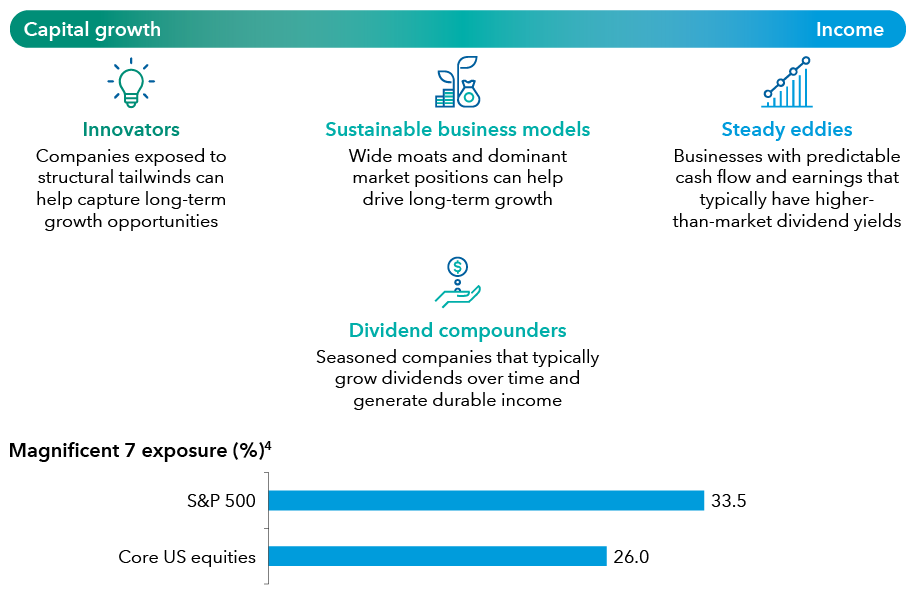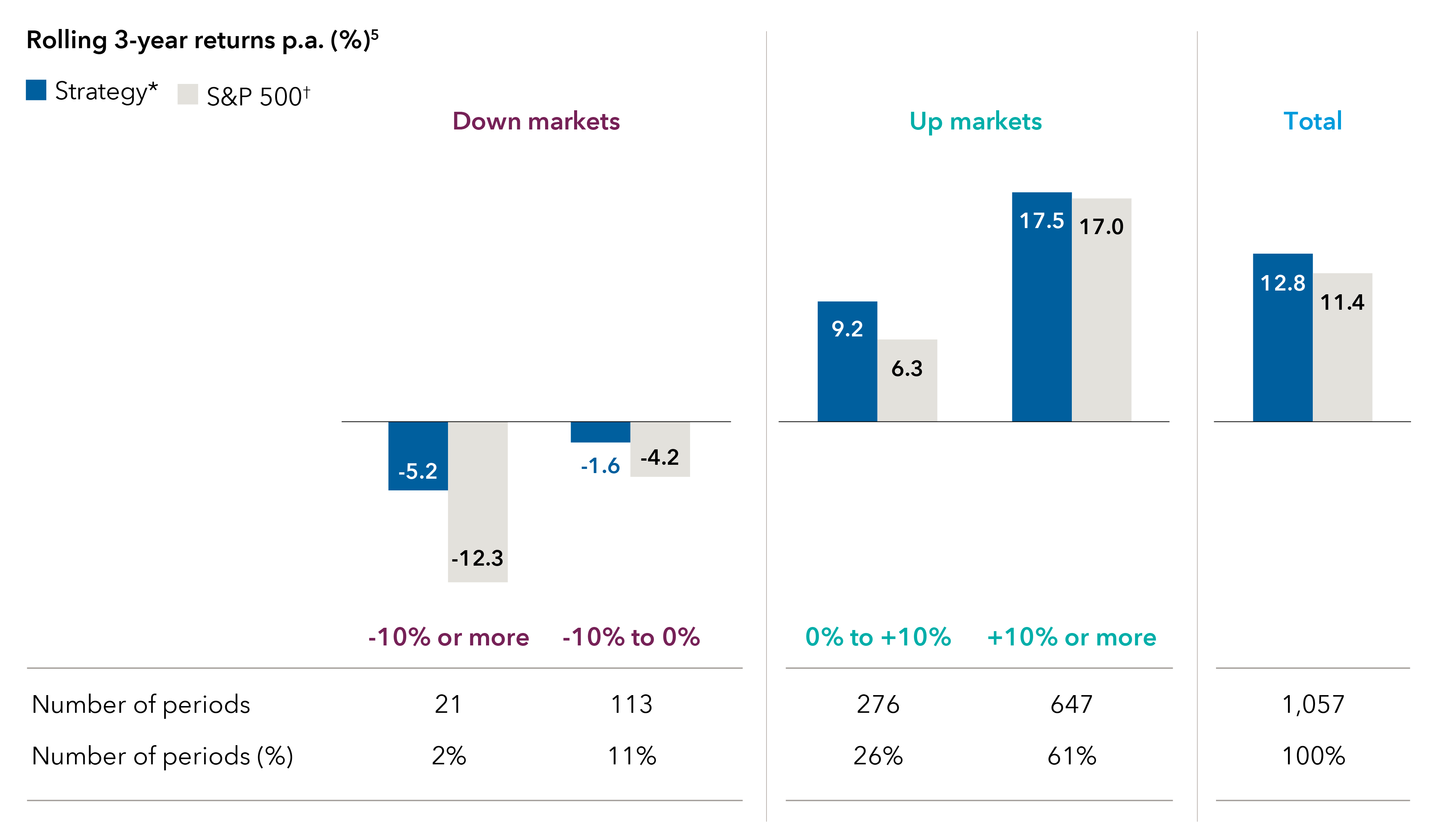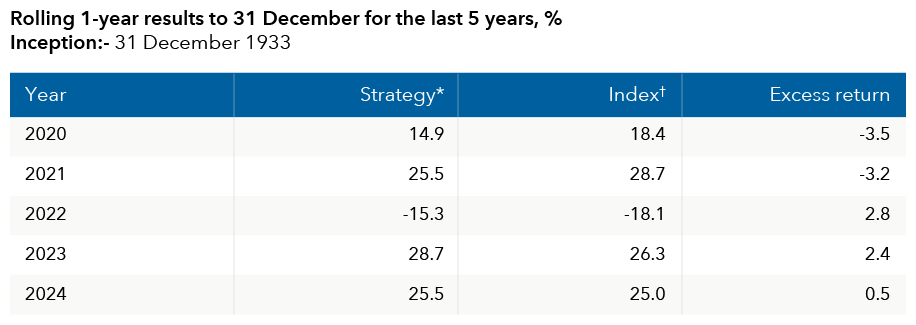Past results are not a guarantee of future results.
Proven approach to core US equities for over 90 years
90+ year track record of providing our investors with access to US equity market growth whilst prioritising consistency and stability1, through a core US equity strategy
The experience to deliver
The investment team behind this strategy

Aline Avzaradel
Portfolio Manager
San Francisco office

Grant Cambridge
Portfolio Manager
Los Angeles office

Greg Miliotes
Portfolio Manager
San Francisco office

Jim Lovelace
Equity Portfolio Manager
Los Angeles office

James Terrile
Portfolio Manager
Los Angeles office

Jessica Spaly
San Francisco office

Martin Jacobs
Equity Portfolio Manager
Los Angeles office

Martin Romo
Chair and Chief Investment Officer
San Francisco office

Research Portfolio
Research analysts are allocated part of the fund assets to manage
WHY CAPITAL GROUP
A leader in global investing
For more than 90 years, we've been searching the world for long-term opportunities, making Capital one of the oldest global investors today.
Global investing credentials
US$2.8T
in total assets managed
27 years
average investment experience of our portfolio managers
US$2.2T
equity assets managed
High conviction investments. Diverse perspectives.
The Capital SystemTM combines independent, high-conviction decision-making with the diversity that comes from multiple perspectives.
We believe ESG is key to successful investing. So we consider environmental, social and governance issues before we invest.
We're here with the support and solutions you need.
Don't hesitate to reach out if you have questions or need assistance.
All information as at 31 December 2024 and attributed to Capital Group, unless otherwise specified.
1 Consistency and stability are based on investment results for our core US equity strategy, the Capital Group Investment Company of America Composite, which has demonstrated lower volatility than the S&P 500 Total Return Index in USD terms over the long term. Sources: Capital Group, S&P
2 Broad market participation during mid-cycle economic phase in the US is based on monthly index data from December 1973 to August 2024. Index data is based on Datastream US Total Market Index from 31 December 1973 through 31 December 1994, and MSCI USA Index data thereafter. Business cycles are forward-looking estimates by Capital Group economists, shown for illustrative purposes only. The views of individual portfolio managers and analysts may differ. Sources: Capital Group, MSCI
3 Positions within the business cycle are forward-looking estimates by Capital Group economists as of December 2023 (2024 bubble) and September 2024 (2025 bubble). The views of individual portfolio managers and analysts may differ. Returns data is monthly from December 1973 to August 2024. Data is Datastream US Total Market Index from 31 December 1973 through 31 December 1994 and MSCI USA data thereafter. Returns data reflects all completed cycle stages through 31 October 2024. Returns are in USD terms. Sources: Capital Group, MSCI
4 Data from 31 December 2022 to 31 December 2024 for the representative account Capital Group Investment Company of America (LUX)(ICA) % exposure to Magnificent 7 relative to S&P 500 Total Return Index in USD terms. Magnificent 7: Alphabet, Amazon, Apple, Meta, Microsoft, Nvidia and Tesla. Sources: Capital Group, MSCI
5 As at 31 December 2024. Returns are in USD terms, based on our core US equity strategy Capital Group Investment Company of America Composite. Sources: Capital Group, S&P
* The results shown for our core US equity strategy Capital Group Investment Company of America Composite since its inception on 31 December 1933. Results are asset-weighted and based on initial weights and monthly returns. Before management fees and expenses.
† S&P 500 Total Return Index
Risk factors you should consider before investing:
• This material is not intended to provide investment advice or be considered a personal recommendation.
• The value of investments and income from them can go down as well as up and you may lose some or all of your initial investment.
• Past results are not a guarantee of future results.
• If the currency in which you invest strengthens against the currency in which the underlying investments of the fund are made, the value of your investment will decrease. Currency hedging seeks to limit this, but there is no guarantee that hedging will be totally successful.
• Some portfolios may invest in financial derivative instruments for investment purposes, hedging and/or efficient portfolio management.
• Depending on the strategy, risks may be associated with investing in fixed income, derivatives, emerging markets and/or high-yield securities; emerging markets are volatile and may suffer from liquidity problems.

_EN.png)





